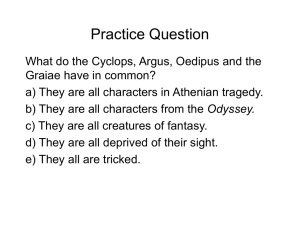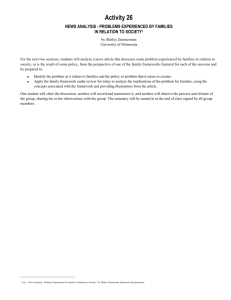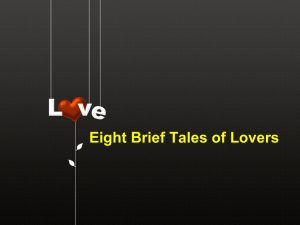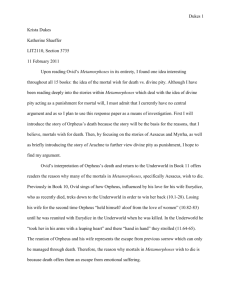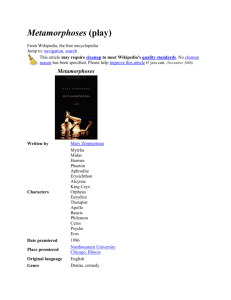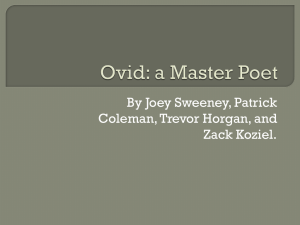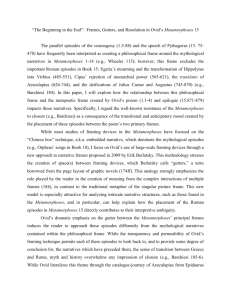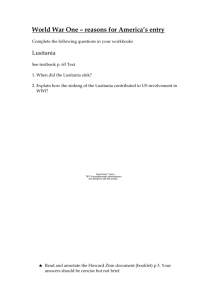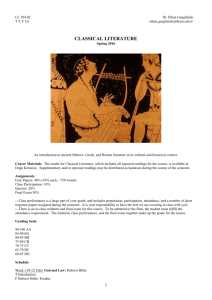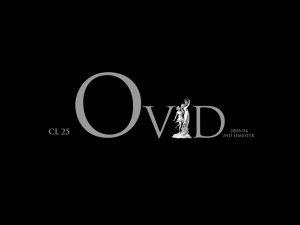to ZACH's Metamorphoses Audience Guide
advertisement
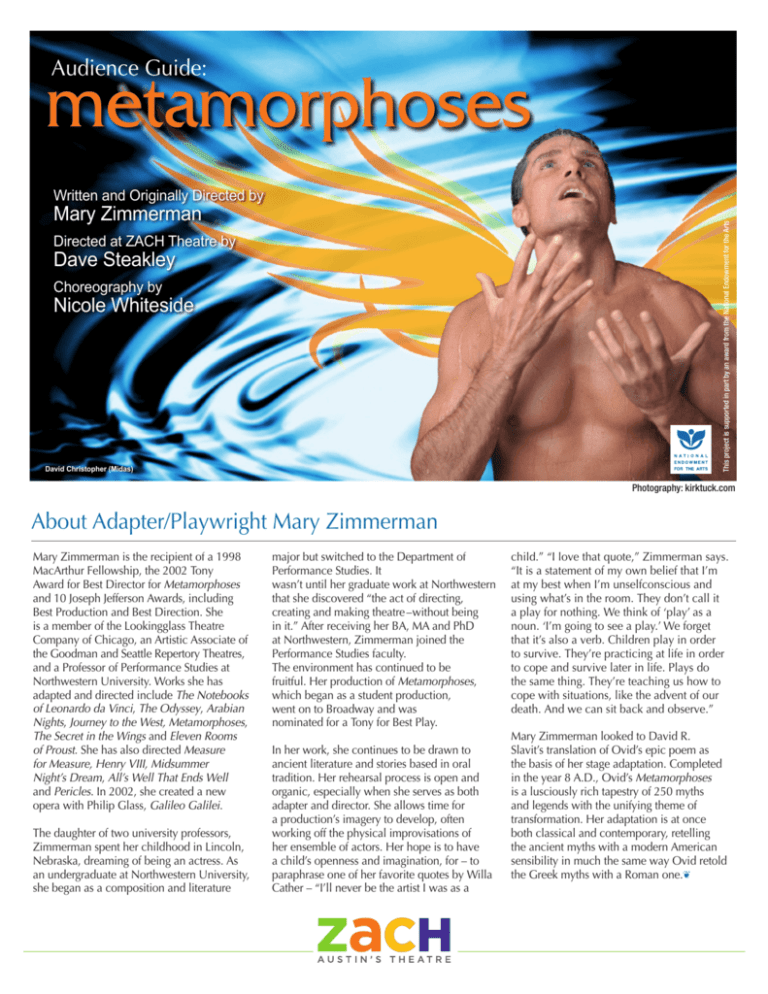
Audience Guide: metamorphoses Written and Originally Directed by This project is supported in part by an award from the National Endowment for the Arts Mary Zimmerman Directed at ZACH Theatre by Dave Steakley Choreography by Nicole Whiteside David Christopher (Midas) Photography: kirktuck.com About Adapter/Playwright Mary Zimmerman Mary Zimmerman is the recipient of a 1998 MacArthur Fellowship, the 2002 Tony Award for Best Director for Metamorphoses and 10 Joseph Jefferson Awards, including Best Production and Best Direction. She is a member of the Lookingglass Theatre Company of Chicago, an Artistic Associate of the Goodman and Seattle Repertory Theatres, and a Professor of Performance Studies at Northwestern University. Works she has adapted and directed include The Notebooks of Leonardo da Vinci, The Odyssey, Arabian Nights, Journey to the West, Metamorphoses, The Secret in the Wings and Eleven Rooms of Proust. She has also directed Measure for Measure, Henry VIII, Midsummer Night’s Dream, All’s Well That Ends Well and Pericles. In 2002, she created a new opera with Philip Glass, Galileo Galilei. The daughter of two university professors, Zimmerman spent her childhood in Lincoln, Nebraska, dreaming of being an actress. As an undergraduate at Northwestern University, she began as a composition and literature major but switched to the Department of Performance Studies. It wasn’t until her graduate work at Northwestern that she discovered “the act of directing, creating and making theatre –without being in it.” After receiving her BA, MA and PhD at Northwestern, Zimmerman joined the Performance Studies faculty. The environment has continued to be fruitful. Her production of Metamorphoses, which began as a student production, went on to Broadway and was nominated for a Tony for Best Play. In her work, she continues to be drawn to ancient literature and stories based in oral tradition. Her rehearsal process is open and organic, especially when she serves as both adapter and director. She allows time for a production’s imagery to develop, often working off the physical improvisations of her ensemble of actors. Her hope is to have a child’s openness and imagination, for – to paraphrase one of her favorite quotes by Willa Cather – “I’ll never be the artist I was as a child.” “I love that quote,” Zimmerman says. “It is a statement of my own belief that I’m at my best when I’m unselfconscious and using what’s in the room. They don’t call it a play for nothing. We think of ‘play’ as a noun. ‘I’m going to see a play.’ We forget that it’s also a verb. Children play in order to survive. They’re practicing at life in order to cope and survive later in life. Plays do the same thing. They’re teaching us how to cope with situations, like the advent of our death. And we can sit back and observe.” Mary Zimmerman looked to David R. Slavit’s translation of Ovid’s epic poem as the basis of her stage adaptation. Completed in the year 8 A.D., Ovid’s Metamorphoses is a lusciously rich tapestry of 250 myths and legends with the unifying theme of transformation. Her adaptation is at once both classical and contemporary, retelling the ancient myths with a modern American sensibility in much the same way Ovid retold the Greek myths with a Roman one.❦ Synopsis of the Stories in Metamorphoses Rich King Midas shuns his daughter for being disruptive during his speech. A drunken Silenus enters and, before passing out, speaks of a faraway land that grants eternal life. Bacchus comes to retrieve Silenus, and grants Midas a wish for his graciousness towards Silenus, and Midas wishes to have whatever he touches turn to gold. He accidentally turns his daughter to gold, and is told by Bacchus to seek a mystic pool that will restore her to normal. Midas leaves on his quest. Aaron Alexander and Rachel Wiese (Cinyras and Myrrha) Alcyone & Ceyx King Ceyx voyages into the ocean to visit an oracle, despite his wife Alcyone‘s warnings. Poseidon destroys Ceyx’s ship, and he is killed, unbeknownst to Alcyone. Prompted by Aphrodite, Alcyone dreams of Ceyx, who tells her to go to the shore. With mercy from the gods, the two are reunited, transformed into seabirds, and fly away together. ERYSICHTHON Erysichthon, a sacrilegious man, cuts down a tree sacred to the goddess Ceres. In an act of vengeance, Ceres commands the spirit Hunger to curse Erysichthon with an insatiable appetite. After eating endlessly and spending his fortune on food, Erysichthon sells his mother to a merchant. She prays to the god Poseidon who turns her into a little girl and she escapes from the merchant. Erysichthon succumbs to his hunger and devours himself. ORPHEUS & EURYDICE This story is told twice, first from Orpheus’ point of view. Orpheus married Eurydice when she is bitten by a snake and dies. Distraught, Orpheus travels to the Underworld ruled by Hades to strike a deal to retrieve Eurydice. Hades lets Eurydice return with Orpheus on one condition: Eurydice must follow behind Orpheus and he cannot look back at her–if he does, she must stay in the Underworld forever. Orpheus agrees, and, when he is almost back to the living world, he looks back and she is plucked away. The action is repeated many times, each reminding Orpheus of losing his bride. The second telling is Jonathan Itchon (Hermes) from the point of view of Eurydice in the Rainer Maria Rilke poem of 1908. After an eternity of this repeated action, Eurydice becomes fragile and forgetful, no longer remembering Orpheus. She returns to the Underworld unknowing of Orpheus, whom she loved long ago. NARCISSUS A beautiful young man named Wesley Scott (Narcissus) PHAETON Phaeton tells his Therapist of a distanced relationship with his father Apollo, God of the Sun. After being bullied in school, Phaeton goes to his father, who drives the sun across the sky each day. Racked with guilt of fatherly neglect, Apollo allows Phaeton to “drive” the sun across the sky as compensation for years of absence. Phaeton drives the sun too close to the earth and scorches it. Narcissus catches a glimpse of his own reflection in a pool. He becomes transfixed and paralyzed, and a narcissus plant replaces him. EROS & PSYCHE “Question” and “Answer” POMONA & VERTUMNUS Pomona, a female wood nymph, has refused the hands of many suitors and remains alone. Shy Vertumnus disguises himself in costumes to convince Pomona to fall in love with him. After the story of Myrrha, Pomona tells Vertumnus to take off his silly disguise and the two fall in love. narrate the story of Psyche falling in love with Eros. Q and A tell the audience that they might wander in the darkness of loneliness until they blind themselves to personal romantic desires and give themselves to a deeper love. The voice of the “Question” is performed by Alia Vinson, and the voice of the “Answer” is performed by John Aielli of KUT 90.5’s Eklektikos. MYRRHA Vertumnus tells Pomona the story of King Cinyras and his daughter Myrrha. After denying Aphrodite’s love attempts, Myrrha is cursed by Aphrodite to lust for her father. Myrrha tries to control her urges but finally falls to temptation. With the help of her Nursemaid, Myrrha has three sexual encounters with her father, each time keeping him drunk and blindfolded so he doesn’t know it’s her. The third time, Cinyras takes off his blindfold and tries to strangle Myrrha, who escapes and melts into the pool. BAUCIS & PHILEMON Zeus and Hermes disguise themselves as earthly beggars to experience being mortal. After being shunned by the entire city, they are accepted into the house of a poor married couple, Baucis and Philemon. The couple serves the gods a great feast, unaware of the true identity of the strangers except that they are “children of God”. After the feast, the gods reveal themselves and grant the two a wish. Baucis and Philemon ask to die at the same time to save each other the grief of death, and the gods respond by turning their house into a grand palace and the couple into a pair of trees with branches intertwined.❦ NOTE: The Achilles aerial section in ACT I in your program is now in ACT II after the story of “Pomona and Vertumnus”. Who’s Who in The World of Metamorphoses Listed are the important characters in order that they appear or are referenced in the play. For the most part, the play uses the Greek names of the characters. Erysichthon (err i SICK thon), a mortal man who finds nothing sacred and unwisely shows no respect for the gods. Ceres curses him with an insatiable hunger after cutting down a sacred tree. Cinyras (SIN i res), king of Cyprus Zeus (ZOOSS), god of weather, supreme ruler of the gods, lord of the heavens. Ceres (SER eez), the Roman goddess of the Harvest. Nursemaid: a servant who agrees to help Myrrha have sexual relations with her father. Midas (MIGH des), king of Pessinus, Oread (OR ee add), a fierce mountain Apollo (uh PALL low), god of the sun who brings daylight to the world by driving his sunchariot across the sky. renowned for his love of wealth and the ability to turn things into gold. Bacchus (BAHK es), a son of Zeus, is the god of wine and partying. Silenus (sigh LEE nes) a follower of Bacchus, he is almost always drunk, but also possesses many valuable secrets. Alcyone (al SEE ah knee), Ceyx’s Queen and daughter of Aeolus, Master of the Winds, and Ceyx (SEE icks), loving King. The couple has never been separated since their marriage until Ceyx, Captain of a sea vessel, dies at sea by Poseidon’s wrath. The couple is transformed into birds. Hermes (HER meez), messenger of the gods, son of Zeus, who guides the souls of the dead to the underworld. Aphrodite (af ra DIE tee), goddess of love nymph and Ceres’ handmaid. Hunger commanded to latch onto Erysichthon forever with an unquenchable hunger. Poseidon (po SIDE un), the powerful, trident-wielding god of the sea. Orpheus (OR fee as), husband to Eurydice and the greatest of all musicians. His music not only has the power to influence the living, but the inanimate as well. Eurydice (you RID i see) marries Orpheus, but dies on their wedding day after stepping on a snake. She is eventually doomed to the Underworld after Orpheus breaks his promise to Hades, and will spend eternity not remembering her husband. Hades (HAY deez), god of the Underworld. and father to Myrrha. Myrrha (MUR rah), daughter of King Cinyras who denies Aphrodite. Phaeton (FAYI tn), son of Apollo. Therapist: a Freudian psychologist who psychoanalyzes Phaeton. Eros (AIR os), Aphrodite’s son, god of love and desire, who falls in love with Psyche.Also known as Cupid. Psyche (SIGH key), Eros’ wife, the personification of the human soul. Philemon (fi LEE mon) and Baucis (BOWcis), a loving, married couple of great generosity, despite their poverty. Pandora given a box by Zeus with instructions that she not open it; she gives in to her curiosity and opens it; all the miseries and evils fly out to afflict mankind. and beauty, exhibits jealousy and rashness, as well as love. Persephone (purr SEF ah knee), the goddess of the Underworld and wife of Hades. Sisyphus (SIS i fus), doomed to push a rock Iris (EYE ris), goddess of the rainbow. Vertumnus (ver TUM nes), god of changing seasons and fruitfulness. Tantalus (TAN tuh luss), son of Zeus, Morpheus (MOR fee us), the god of dreams. Ceyx comes back to Alcyone disguised as Morpheus in a dream. up a hill for all eternity cursed to eternal thirst. Pomona (pah MOAN uh), a wood nymph who prefers the company of trees to men. The Poet OVID, 43 B.C. - 17 A.D. One of the most prolific poets of Rome’s Golden Age, Ovid, the name by which Publius Ovidius Naso is commonly known, specialized in the witty and sophisticated treatment of love in all its permutations. Born March 20, 43 B.C., a year after the murder of Julius Caesar, Ovid spent his youth in his native Sulmo, untouched by the civil wars. Shortly after peace resumed, when Augustus ruled unthreatened, Ovid went to Rome to continue his education. His father intended him for a political career, but Ovid quietly rebelled. The literary temptations in the capital and his own spectacular talents drew him inevitably into writing poetry. Before he was 20, he was reading his works to appreciative audiences, and by age 30, he was Rome’s most successful poet. Successes followed for two more decades, when Augustus suddenly dispatched Ovid, then 50, into exile. The circumstances behind this event remain unclear even today. Ovid himself deliberately obscured them (as did the emperor), merely referring to “a poem and an error.” The place of exile was Tomis (modern Costanza, in Romania), a primitive town on the Black Sea. Arriving there in spring of 9 A.D., Ovid fought his longing for his friends, wife and Rome by writing poetry about exile. The last datable poems refer to the year 16, and presumably he died soon after, an unhappy man of 60 whose suffering exposed the authoritarian nature of Augustus. Bill Moyers Interviews Mary Zimmerman (Excerpts are taken from the full interview which can be found at www.zachtheatre.org. BILL MOYERS: We’ve seen how some myths be the same, we can’t go back. But the natural gods in Metamorphoses, and the Greek gods keep human beings imprisoned in political world–the smell of apples–to me remains I believe are 12 different names for feelings and religious shackles. But other myths have innocent. Don’t lose sight of the fact that there inside ourselves. There are moments when redemptive power. They change the way we is still beauty in the world, and there is still love you’re being governed by Aphrodite who is see our world and ourselves. Mary Zimmerman in the world, and these simple pleasures in the chairing the meeting of all the different parts believes in the power of myth to transform, world, which are indelible. of your personality. There are moments when even to transform a swimming pool into you are governed by Zeus, when you’re an ocean of the imagination. That’s what in an authoritative position and you’re “It’s just inevitable. she’s done, making a big splash with very reasonable. There are moments her acclaimed play Metamorphoses. you’re being governed by Mars The soul wanders in the dark until it when She’s taken ancient Roman myths and and you’re crazy angry. But all those brought them to life in the here and now. finds love. And so wherever our love different parts exist inside us; it’s who’s How do you explain the stories’ power chairing the meeting at different times... goes, there goes our soul–If we’re to transform? One of my colleagues who’s really got the upper hand at that went to the play last evening, came out lucky and if we let ourselves be blind moment. and said, “I laughed, I cried, but I felt transformed.” instead of always watching out.” MOYERS: In your story of Cupid and Psyche, the narrator philosophizes on MARY ZIMMERMAN: I’m not sure what happy endings. “It’s just inevitable. The causes that, but there is something about MOYERS: Whose line is it in your play, “Let me soul wanders in the dark until it finds love. these stories being so ancient. And they have step out of my own heart.” And so wherever our love goes there goes, our something to say because they are so ancient, soul–if we’re lucky and if we let ourselves be which helps you take the long view. ZIMMERMAN: “Oh, gods, I pray you change blind instead of always watching out.” me, transform me entirely, let me step out of MOYERS: This play was in rehearsals during my own heart.” I actually wrote that line, and ZIMMERMAN: Yes. That has very personal the World Trade Center attack. it’s partly because when I first made this play I meaning for me. Those ideas are drawn from was undergoing some personal transformation James Hillman writing on the figure of Eros. ZIMMERMAN: Yes. We were in rehearsal in my life. I had lived with the same fella from September 11th and went into technical the age of 20 to 37, and he was leaving me. It MOYERS: The Jungian scholar. rehearsals on the 13th. And it felt strange going was so devastating to me, and change felt so in to rehearse a play at that time, but on the soul destroying and I was frightened of what ZIMMERMAN: Yes. But I believe in that idea other hand, the play suddenly had all of these was to come. I couldn’t stand the state I was that there’s another I, that love operates from very profound resonances. There are at least in; I wanted to be through it–the moment of a sort of internal I, but that we’re often fooled two stories in it where someone goes away, off metamorphoses is so excruciating, but then it by appearances. It’s the Beauty and the Beast story. And I just have faith that if you allow to work basically, and is suddenly taken from can produce something new. yourself to be trusting, to forget about your past the earth–just destroyed. I remember on our hurts, that’s the chance at which you will find first public performance, which was the 18th, MOYERS: The birth. love. That story remains always mysterious to shaking and trembling off stage about showing this and dragging the audience through this ZIMMERMAN: Yes. Something the world me. Their names are Eros, which means love, story, including the dying prayer of a man has created through these horrible changes. and Psyche, which means the soul. Why is it saying, “I only pray my body is found. Just let And I don’t mean that particularly from the forbidden for the soul to look directly on love? my body be found.” The line that has become World Trade Center, but if you take the long It’s the myth that feels like it has the most urgent the most important to me in the play is in the view, we’ve suffered incredible disasters and symbolic content and yet it remains elusive to final minutes. Baucis and Philemon are setting transforming events, and yet story goes on, me. the table for the gods and they’re bringing out narrative goes on. Even though we die, these MOYERS: Do you still think there are happy all this different food, and there’s a moment stories continue and tie together. endings to be embraced? where one of the actors brings out a basket of apples and someone says, “remember how MOYERS: Metamorphoses just seems like such apples smell?” And then everyone pauses and an appropriate play for our time, when God ZIMMERMAN: I do. I think we can’t lose sight of that dream. That dream guides us even if it’s remembers. And that’s a very important line to has no answers. not finally attainable. It brings it out the best me right now, because there’s a lot of rhetoric about how everything is changed, nothing will ZIMMERMAN: Yes, well, there are lots of in us.❦ Special thanks to Sally Jacques, Nicole Whiteside and Corey Fields of Blue Lapis Light, Bonnie Cullum and Vortex Theatre, and Timothy J. Moore, Professor in the Department of Classics at the University of Texas, Austin. This project is funded and supported in part by the City of Austin through the Cultural Arts Division and by a grant from the Texas Commission on the Arts and an award from the National Endowment for the Arts, which believes that a great nation deserves great art.
